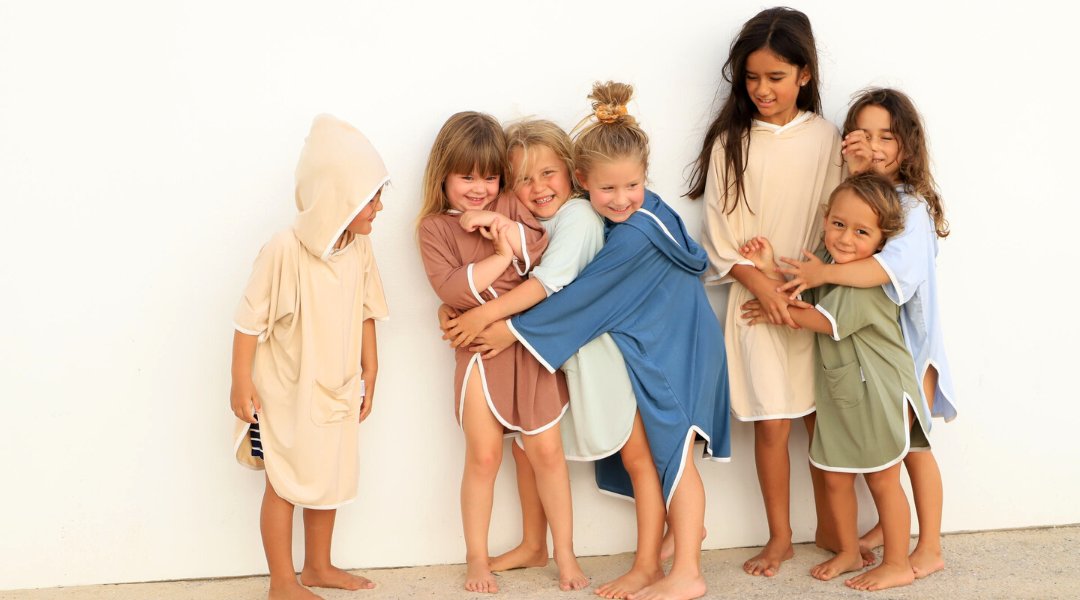Bamboo's Story
WHY BAMBOO?
Bamboo is a remarkable and highly versatile natural resource. It is only relatively recently that the Western world has discovered how bamboo offers a wide range of benefits and an eco-friendly solution to many of our modern requirements. It is, quite simply, a wonderful, green resource that is hugely beneficial both to the way we want to live our lives and to the environment.
Here are the top 10 benefits of bamboo clothing:
1. UV Resistant
Shield your skin from the sun’s rays in comfort with bamboo clothing’s superior UV protective qualities. There is no other natural fibre used for textiles that has this very useful property.
By protecting our skin against UV rays, bamboo fibre acts as a protective agent. Wearing clothing made from bamboo fibre will protect you from the harmful effects of UV rays that you cannot avoid when walking or sitting under the sun. Instead of avoiding the sun completely, staying indoors and blocking out its light, use materials made of bamboo fibre to protect yourself while you enjoy the sunshine.
2. Eco-friendly
Bamboo clothing is synonymous with eco-fashion. Bamboo clothes are made from a hardy, evergreen grass that re-grows within a year of harvesting and can be continually re-harvested. It is the fastest growing plant on the planet!
Its environmental impact is low because it requires no chemical fertilisers or pesticides and needs little water to grow. Bamboo crops also restore degraded land, protect against soil erosion and purify the air. Crops of bamboo yield significantly more than both wool or cotton crops.
Did you know bamboo detoxifies the air we breathe? This one benefits both you and the environment, as bamboo produces 30% more oxygen than the same amount of trees – absorbing more carbon dioxide and greenhouse gases. Enviro-win!
And just in case you were wondering: Pandas in the wild like to eat about twenty-five types of bamboo. They don’t like Moso, the one used for bamboo clothing. Another win!
All of these factors contribute to bamboo fibre being considered a sustainable, versatile and eco-friendly resource for clothing.
3. Breathable
Bamboo clothes are light, airy and significantly more breathable than traditional fibres and synthetics because they are derived from plant fibres.
4. Hypoallergenic
Bamboo clothing is hypoallergenic; a pleasant alternative for anyone with skin sensitivities, dermatitis or other allergies. Many people with sensitive skin report that clothes made from bamboo are far less irritating to the skin than other traditional fabrics. The smooth rounded fibres of bamboo viscose significantly reduce irritation, making it a good choice for those who suffer from allergies, in particular eczema. All our products are certified with the Okeo-Tex 100 Standard ensuring that no residual chemicals or harmful elements are present in the fabric used for manufacturing our garments. Bamboo clothing is also lightweight and extremely breathable. Heat and perspiration can irritate and inflame sensitive skin, so the natural temperature regulating properties of bamboo are of great benefit. Bamboo fibre is moisture wicking, helping to keep the skin dry and fresh. Bamboo clothes are cool in summer, and warm in winter so can be worn all year round.
5. Antibacterial and odour resistant
Bamboo grows organically (without pesticides or fertilisers) due to its inbuilt antibacterial characteristics. It is rarely eaten by pests or infected by pathogens. Bamboo fibre is antimicrobial because of a natural component in the bamboo plant called kun. Bamboo kun is a bacteriostatic agent. This means that it is anti-bacterial and anti-fungal. Kun is naturally found in the bamboo plant itself, and is actually only found in bamboo. Bamboo fibre is therefore resistant to bacterial and fungal growth, which can cause infection and disease.
Being antimicrobial, bamboo fibre is the safest material to have close to the body. Babies, people with allergies, and others who are highly sensitive to infection have an additional layer of protection with bamboo fibres around. The bamboo kun protects them from harmful bacteria and fungi that can cause disease.
It is also this unique antibacterial property of bamboo fibre that makes it odour resistant. Bamboo kun stops odour-producing bacteria that can thrive on other types of fibres such as cotton and polyester.
6. Biodegradable
As a natural product derived from plants, bamboo fibre is biodegradable. Having reached their useful life, products made from bamboo can be composted and disposed of in an organic and eco-friendly manner. Synthetic fibres such as nylon or rayon remain in landfill for a significantly longer time.
7. Moisture Wicking
Bamboo clothing absorbs and evaporates moisture faster than cotton. It’s the ultimate natural fabric for beach wear, as water is pulled away from your skin. it is an ideal fabric for clothing worn directly against the skin, especially for children, due to their sensitive skin.
8. Luxuriously soft
Bamboo fibre is exceptionally soft and feels great against your skin. Bamboo fabric is similar to the softness of silk. Since the fibers are without chemical treatment, they are naturally smoother and rounder with no sharp spurs to irritate the skin,While the plant itself may not seem like it would make for soft clothing, the process of extracting bamboo cellulose and converting it into fibre results in a very smooth and soft yarn. This yarn is weaved into the fabric used for bamboo clothing.
9. Durable
Bamboo cloth is more durable than silk and many of the other textiles that are considered strong and resistant to wear and tear. The actual weave of any fabric of course plays into this durability, However, the smoothness of bamboo fibre along its strands and its points contributes greatly to its innate durability.
Because it does not have the jagged edges and ends that other materials do, fabric made from bamboo fibre does not wear out easily. Jagged edges get caught on each other and on other materials when they com in contact. This causes them to be pulled away and apart, leading to what we recognise as wear and tear.
For the best maintenance of bamboo clothing, it should be washed using the gentle cycle, cold or luke warm water, where line dried is preferred. It is best to refrain from machine drying even on low heat as it may cause the garment to loose its shape sooner than if you line dried only. If necessary, it should be ironed on low heat and never with a steamer. A gentle tumble dry or cool iron can also be used if necessary but you should find that the bamboo fabric is relatively quick drying. Bamboo is especially ideal when travelling because it’s compact and wrinkle resistant.
10. Insulating
Bamboo is a naturally insulating fibre. When woven into fabric, bamboo clothing helps to trap a small layer of air against the skin. This layer acts as insulation, helping to keep the wearer cool in the hot weather, and warm during winter. Bamboo is nature’s solution to comfort in any season.


